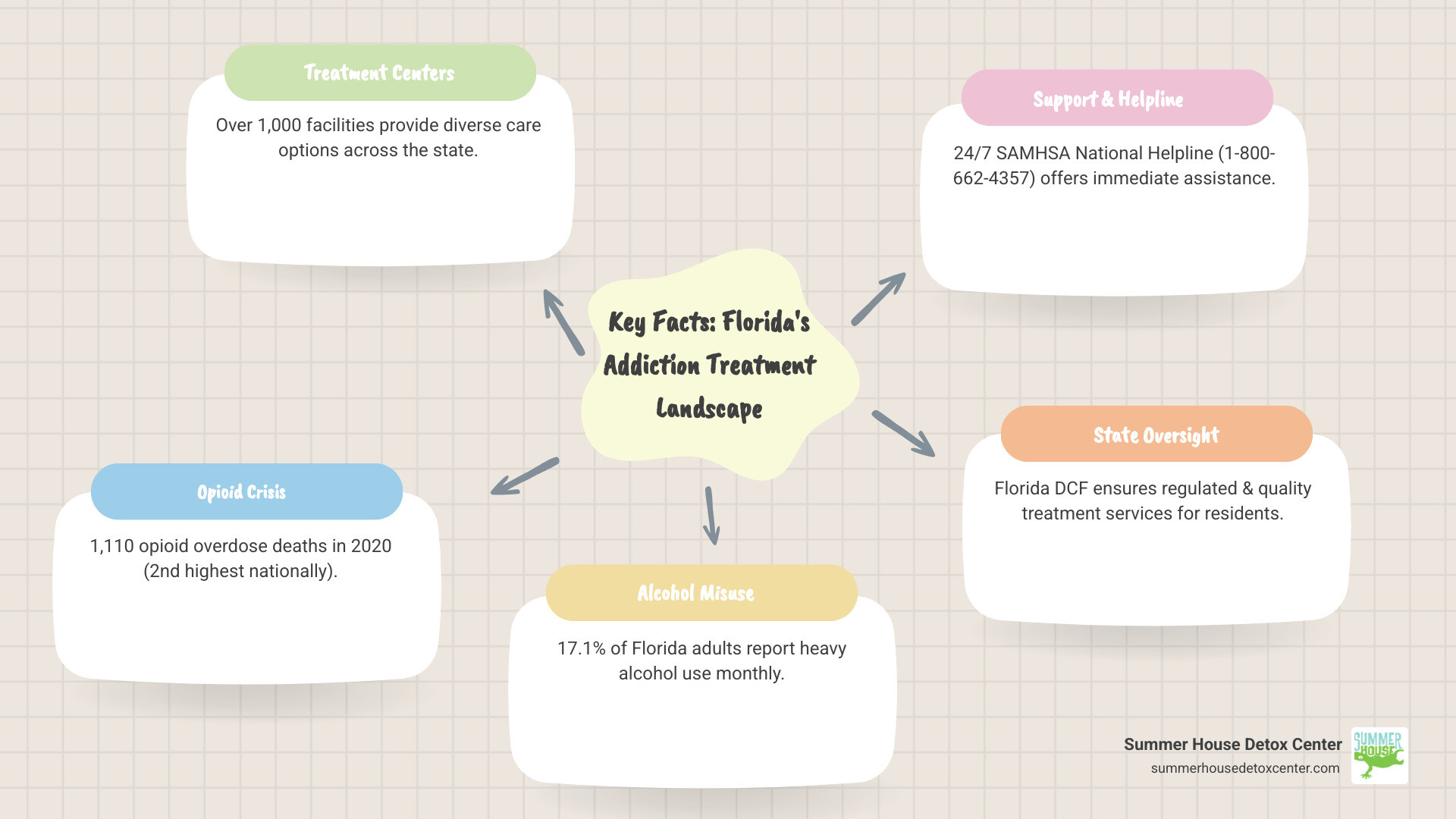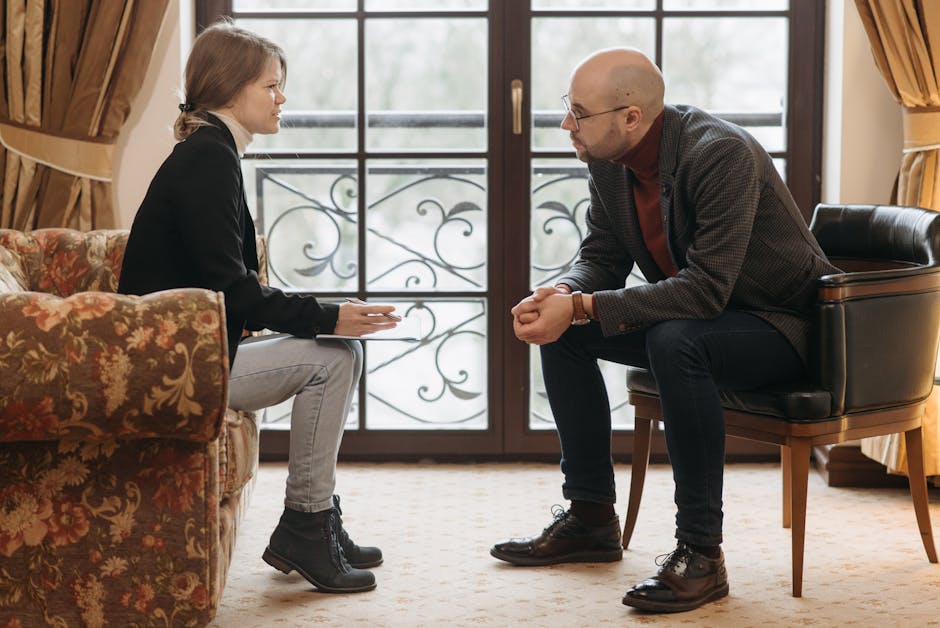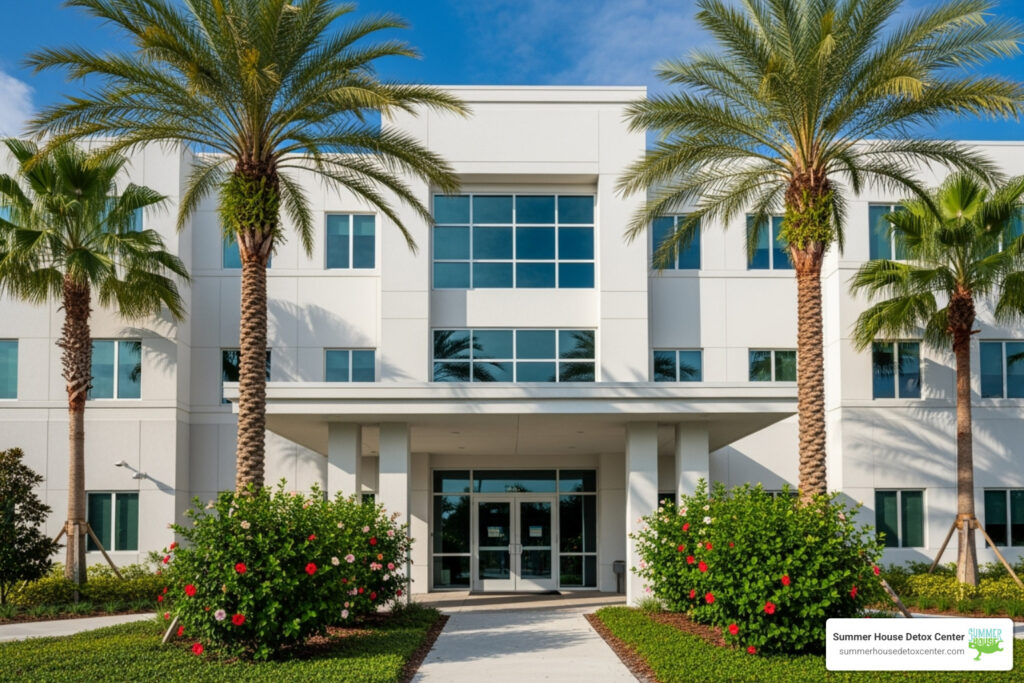The State of Addiction and Mental Health in Florida
Florida treatment facilities offer hope for thousands seeking recovery from addiction and mental health challenges. With over 1,000 centers, Florida has the third-highest number of addiction treatment resources in the nation, responding to significant substance use challenges with a comprehensive network of care.
Key Facts About Florida’s Treatment Landscape:
- 1,000+ treatment facilities statewide
- 2nd highest in the nation for opioid-related overdose deaths (1,110 in 2020)
- 17.1% of Florida adults report heavy alcohol use monthly
- 24/7 support available through SAMHSA’s National Helpline (1-800-662-4357)
- State oversight through Florida Department of Children and Families
From Miami’s active recovery community to quiet coastal towns, Floridians can find everything from detox to residential programs. The state’s treatment landscape also addresses co-occurring disorders like depression and anxiety, which often fuel substance use.

Common florida treatment facilities vocab:
Why Florida is a Hub for Recovery
Florida is a premier destination for recovery due to its unique healing environment. The warm climate and sunshine can naturally improve mood, which is a significant advantage in early recovery. Beyond the weather, Florida has a large, vibrant recovery community with a robust network of support groups and alumni networks. This means you’re not alone after completing a program.
The state also offers a diverse range of treatment options, from structured residential programs to holistic therapies. This variety allows for personalized treatment plans, which is why many people travel for treatment to Florida for its high quality of care.
Understanding State Oversight and Resources
Florida treatment facilities operate under the oversight of the Florida Department of Children and Families (DCF), which ensures services meet established standards. DCF manages a statewide program through a community-based provider system, offering services like detox, treatment, and recovery support.
In addition to community programs, Florida has state-operated mental health treatment facilities for more intensive or long-term care. You can learn more from the Florida Department of Children and Families. For a national search tool, FindTreatment.gov is a confidential resource that helps locate facilities across the U.S., with information updated annually by SAMHSA.
Navigating the Levels of Care in Florida Treatment Facilities
Understanding the different levels of care can help you make an informed decision. Addiction and mental health care require a spectrum of services custom to individual needs, often following the American Society of Addiction Medicine (ASAM) criteria. The goal is to provide the most effective care at the right intensity, allowing for a gradual “stepping down” as you gain stability.

1. Medical Detoxification: The First Step
For many, recovery begins with medical detoxification. This is the process of safely managing physical withdrawal symptoms as the body rids itself of drugs or alcohol. Medically supervised detox is crucial, as quitting “cold turkey” can be dangerous, especially with substances like alcohol or benzodiazepines.
Our approach focuses on comfort and support, with 24/7 medical care from experienced staff, including board-certified physicians and nurses. This ensures your withdrawal is as safe as possible, with medications to ease symptoms and constant monitoring. Learn more about the importance of medically supervised detox. Whether it’s alcohol detox or opiate detox, a solid medical foundation is key.
2. Inpatient and Residential Treatment
After detox, many transition to inpatient or residential treatment. These programs offer a highly structured, 24-hour supportive environment where individuals live at the facility, free from outside triggers. Days are filled with intensive individual and group therapy, educational workshops, and holistic activities designed to address the root causes of addiction. The peer support in these settings is invaluable, creating a powerful sense of community. Explore what these programs entail at resources like Drug Rehab Hollywood FL.
3. Outpatient Programs: PHP, IOP, and Standard OP
Outpatient programs offer continued support while allowing clients to reintegrate into daily life. This is a great way to practice new coping skills with a safety net of support.
Here’s a quick comparison of the main types of outpatient care:
| Level of Care | Hours per Week | Living Situation | Ideal Candidate |
|---|---|---|---|
| Partial Hospitalization Program (PHP) | 25+ hours (often 5-7 days/week, 6+ hours/day) | Lives at home or in sober living | Needs intensive care but doesn’t require 24/7 medical supervision; stepping down from residential. |
| Intensive Outpatient Program (IOP) | 9-20 hours (often 3-5 days/week, 3-5 hours/day) | Lives at home or in sober living | Transitioning from PHP or residential; needs significant support while managing daily responsibilities. |
| Standard Outpatient Program (OP) | 1-8 hours (often 1-2 days/week, 1-3 hours/day) | Lives at home | Stable in recovery; needs ongoing support, relapse prevention, and maintenance. |
The flexibility of outpatient care supports personal and professional growth while building a strong foundation in sobriety. Understand the differences by exploring inpatient vs. outpatient programs. Aftercare drug rehab is a vital part of the ongoing journey.
Key Treatment Philosophies and Therapies
Effective florida treatment facilities provide personalized care built on proven methods. The goal is to address the root causes of addiction, not just the symptoms, creating space for holistic healing of the mind, body, and spirit.

Evidence-Based Therapies
The gold standard in addiction treatment involves scientifically proven methods that provide real-world tools for recovery.
- Cognitive Behavioral Therapy (CBT) helps you identify and change negative thought patterns and behaviors that fuel substance use. Learn more about how CBT is used at alcohol rehab.
- Dialectical Behavior Therapy (DBT) is effective for intense emotions, teaching skills in mindfulness, distress tolerance, emotional regulation, and interpersonal effectiveness.
- Medication-Assisted Treatment (MAT) combines medications with counseling to reduce cravings and withdrawal symptoms, particularly for opioid and alcohol addiction. Understanding Medication-Assisted Treatment can show you how this approach makes recovery more accessible.
Addressing Co-Occurring Disorders (Dual Diagnosis)
Addiction rarely exists in a vacuum. About half of people with substance use disorders also have a co-occurring mental illness like anxiety, depression, or trauma. Often, substance use begins as an attempt to self-medicate emotional pain.
That’s why integrated treatment is so important. Florida treatment facilities that focus on dual diagnosis care address both addiction and mental health conditions simultaneously, leading to more sustainable recovery. If you’re facing both challenges, dual diagnosis rehab offers the comprehensive care you need. Explore the link between anxiety and substance use to understand this connection better.
Holistic and Complementary Approaches
Recovery is about healing the whole person. Alongside evidence-based therapies, holistic approaches nurture your well-being and help you build a life you love.
- Yoga, meditation, and mindfulness teach you to manage stress and reconnect your mind and body.
- Nutrition therapy supports physical and emotional balance. Proper nutrition is crucial, as explained in the role of nutrition in detox.
- Art and adventure therapies offer alternative ways to express emotions, build confidence, and find a renewed sense of possibility.
These complementary methods, woven into a traditional therapy plan, create a rich environment for personal growth and lasting recovery.
How to Find and Choose the Right Facility
Finding the right florida treatment facilities starts with assessing your specific needs. Consider the environment that will help you thrive, whether it’s a busy urban setting like Miami or a quieter coastal area. Also, think about your specific needs, such as dual diagnosis expertise, medical conditions, or professional flexibility. Staff qualifications are also key; look for compassionate, experienced professionals.

What to Look for in Florida Treatment Facilities
When evaluating facilities, look for credentials that signify quality and safety. Key accreditations include The Joint Commission (Gold Seal of Approval), CARF (Commission on Accreditation of Rehabilitation Facilities), and Florida DCF licensure. Also, consider the staff-to-client ratio (smaller is often better), the use of evidence-based practices like CBT or MAT, and individualized treatment plans. For more guidance, especially for South Florida, see our article on finding the right detox centers in South Florida.
Insurance and Payment Options
Cost should not be a barrier to treatment. Most reputable florida treatment facilities accept insurance. The first step is to verify your coverage, which is a confidential process. Understanding if a facility is in-network or out-of-network will affect your costs. Many centers offer free insurance verification; you can start the process with us here: Contact Us: Am I Covered?.
If you don’t have insurance, private pay and state-funded options are often available. The Mental Health Parity and Addiction Equity Act (MHPAEA) also requires most health plans to cover addiction treatment similarly to other medical conditions.
Specialties Offered by Florida Treatment Facilities
Florida’s treatment centers offer many specialized programs to create environments where people feel understood. These can include:
- Gender-specific programs for men and women.
- LGBTQ+ affirming care in safe, inclusive spaces.
- Programs for veterans addressing service-related trauma. Learn more about Why Do Veterans Have a High Need for Alcohol Treatment?.
- Executive or professional tracks for those needing to maintain work responsibilities.
- Age-specific programs for teens or older adults.
Specialized tracks make treatment more relevant and effective by connecting you with peers who share similar life experiences.
Support Systems for Families and Loved Ones
Addiction is a family disease, affecting every relationship. The good news is that recovery can heal these dynamics. Many florida treatment facilities know that supporting the entire family is essential for lasting success. Family involvement is transformative, but it often requires family members to heal, too. Learning about codependency, setting healthy boundaries, and improving communication are vital. The role of family therapy in substance abuse treatment is to help rebuild these connections with honesty and respect.
Family Therapy and Education
The best florida treatment facilities invite the whole family into the healing process. Family therapy provides a safe space to share experiences without judgment. A key breakthrough is understanding addiction as a disease, which can lift the guilt and blame that weigh families down. Through therapy and educational workshops, families learn to communicate better, rebuild trust, and gain practical skills for supporting recovery. If you need guidance, read about how to help a spouse with addiction.
Support Groups and Resources
Connecting with others who understand is incredibly powerful. Al-Anon and Nar-Anon are support groups across Florida where family members can find strength in a shared community. These groups teach that you can’t cause, control, or cure addiction, but you can find peace for yourself.
For 24/7 support, the SAMHSA National Helpline (1-800-662-4357) can connect you to local community resources in Miami and throughout Florida. Your encouragement is a powerful force, as discussed in the role of emotional support during detox. Remember to take care of yourself while you support your loved one on their path to healing.
Frequently Asked Questions about Florida Treatment Centers
Choosing a treatment facility brings up many questions. Here are answers to some of the most common concerns we hear from those considering florida treatment facilities.
How long does rehab in Florida typically last?
The length of treatment depends on your unique situation, as recovery is not a one-size-fits-all process. While most programs offer 30, 60, or 90-day options, the timeline is guided by your individual progress. Florida’s treatment landscape uses a continuum of care model, where you might move from detox to residential care and then to outpatient programs. Clinical teams will assess your progress and adjust recommendations accordingly. Research shows longer treatment often leads to better outcomes. For more details, see How Long is Alcohol Treatment After Detox?.
Can I lose my job for attending a treatment facility?
No, federal laws are in place to protect you. The Family and Medical Leave Act (FMLA) allows eligible employees to take up to 12 weeks of unpaid, job-protected leave for medical reasons, including addiction treatment. Additionally, the Americans with Disabilities Act (ADA) protects individuals in recovery from discrimination. Confidentiality laws like HIPAA also ensure your treatment records remain private. Your employer cannot fire you for seeking the help you need.
What should I pack for treatment in Florida?
Most facilities provide a packing list. For Florida’s climate, we recommend:
- Comfortable, casual clothing made of breathable fabrics. Include a light jacket for air-conditioned rooms.
- Essential toiletries (alcohol-free products only).
- Identification and insurance cards.
- Any necessary medications in their original prescription bottles.
- A journal and pen for processing thoughts and tracking progress.
For a complete guide, check out How to Pack for Alcohol Treatment in Florida. Being prepared helps you focus on your recovery.
Your Path to Recovery Starts Today
This guide shows that florida treatment facilities offer a remarkable landscape for healing. From its supportive climate and communities to its comprehensive levels of care and specialized therapies, Florida provides a unique environment for recovery. The combination of cutting-edge medical care and genuine compassion means there is a place for you here, no matter your circumstances.
Hope is always within reach. It is never too late to start over, and every day, people take that brave first step toward a new beginning.
For those in South Florida, the journey often begins with safe, medically supervised detox. Modern detox focuses on your comfort, dignity, and support, guided by an experienced medical staff who understand what you’re going through.
At Summer House Detox Center in Miami, we provide an environment where you can start healing from day one. We offer a blend of professional medical care and genuine warmth to support you through the first steps of recovery. Your healthy, happy, and free future is waiting. If you’re ready to see what recovery can look like, learn more about detox facilities in Florida and take that vital first step today.
